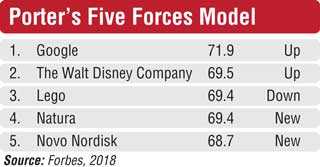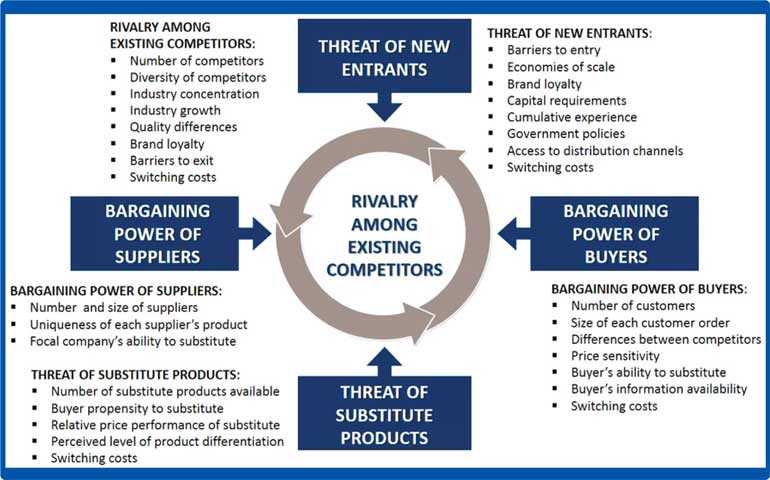Thursday Feb 19, 2026
Thursday Feb 19, 2026
Tuesday, 14 January 2020 00:00 - - {{hitsCtrl.values.hits}}
The academic teachings in business expressly or impliedly advocate the notion of correlation between knowledge and outcome in which there is some belief that knowledge through futuristic models in  business and strategies recommended may result in success. However, most success stories in reality are not supported by prior academic knowledge and on the contrary, what is stated in academic literature is mostly emerging from post events or stories.
business and strategies recommended may result in success. However, most success stories in reality are not supported by prior academic knowledge and on the contrary, what is stated in academic literature is mostly emerging from post events or stories.
This study that I undertook focuses on a different perspective of micro and macro environment spelt out in academic fields which help businesses to assess a situation through SWOT analysis that enable adapting relevant strategies. There are two implications of following the SWOT model firstly, the degree of shadow it overlays to decisions made through gut feelings that some have taken to reach success and secondly such straight forward analysis ignore the nature of moving circumstances and changing situations rapidly.
Francis Lucille, the spiritual speaker in his book ‘Perfume of Silence’ says, “Just stick to the ordinary circumstances without labelling them ordinary. Be open to them with no desire to change them in any way. They are, in fact, already magical and miraculous.”
Although the statement is seen vague, this opens us to the mystery of the circumstances that operate beyond human comprehension and yet business education explicitly embraces role models whose traits are, sometimes fed into budding executives and undergrads implying that such traits of leaders are worth following in spite of they being contradictory if one reads real success factors of business tycoons from the view point of circumstances.
In the case of medicine, engineering, law and other skilled related disciplines, there are key knowledge-based skills to learn, meaning that one cannot practice without learning namely performing a surgery, fixing a gas line or a water leak. Learning therefore is necessary in these professions but here again success in terms of material gains depends on other variables, be they internal or external which for instance make some prosperous in wealth and others not.
In Sri Lanka, business success is generally measured by creation of wealth, ROI and profits and individually, mansions they build, type of vehicle used, power held, popularity, etc. Sometimes  achievements are announced in comfort zones of monopoly or cartels, for a while until the competition hits from nowhere in the medium to long run. The successes are then related to personal stories without offering much tribute to team work and people who work at the back end away from the limelight.
achievements are announced in comfort zones of monopoly or cartels, for a while until the competition hits from nowhere in the medium to long run. The successes are then related to personal stories without offering much tribute to team work and people who work at the back end away from the limelight.
Olivia Durdan attributes success factors (as reviewed by Elisa Shoenberger) to have a great idea, set high standards, use the right tools, hire the right talent, and build a network business plan success factors.
However the article ends with the big question ‘how?’ (Durdan, 2019), due to the fact that the most important aspects that can be incorporated within the terminology ‘Circumstances’ have been overlooked. Here the terminology ‘circumstances’ is used beyond the usual analysis of micro environment and PESTAL factors as well as Porter’s Five Forces Model.
At the same time, of late, the yardstick of business success modified to include CSR contribution and quality of CSR which is acting as a strong indicator which Sri Lanka is yet to identify and comprehend. The best performers in CSR according to Forbes are given below and this element seems to boost credibility of the company in the eyes of the stakeholders and the observers. In other words, the profit motive is likely to become simply another element of a success in the coming years with the changing perceptions.
With these changes therefore, it is necessary for advanced education institutes to research into ‘ever-changing circumstances’ beyond the usual micro and macro analysis which in fact certain quarters are now trying to understand through philosophies and spirituality. The study therefore focuses on areas that may shed light on this ‘unknown phenomenon’ which may radically change perceptions on post theories as well as leadership traits.
This study took a form of inductive qualitative research and had interviews from leading business personalities with the aid of published information and discussions to ascertain to what extent the circumstances have been conducive or otherwise in the growth of their business citing two specific circumstances in Sri Lanka in 2009 and 2019.
Forbes.com states that successful leaders are the power and intellect behind their organisations. They are the visionaries charged with steering their brand around pitfalls. They must know when to seize opportunities and how to rally employees to work hard toward their company’s goals. (Patel, 2017)
Once again the ‘circumstances’ are not taken into consideration while there could be a correlation as to how a leader could react to circumstances. It is noticeable that the traits given by Forbes are deriving from post theories and there is no foreseeing situations that have given rise to successes with profits as well as to avoid disasters to prevent business collapses. Literature such as Forbes.com hardly describes realities of life such as circumstances that pave way for organisations to reach success or face failures.
Porter’s five forces model also explains the expanded version of micro environment where an organisation has to be cautious and alert all the time. Through this, one may tend to see some actions from suppliers, buyers or competitors having drastic impact on a particular business. (Mindtools, 2017)
Anna Johansson explained ‘once a company is up and running, it tends to stay in operation until some event prevents it from continuing—businesses don’t stop working for no reason. Though occasionally they suffer a slow decline to closing, more often a firm’s shutdown is the result of an internal or external misfortune that compromises the integrity of the operation or starts a chain reaction that leads to collapse’. (Anna Johansson, 2019)
This in a way supports the theory of circumstance as the list can be quite long if we take into consideration the propensities from terrorism to tsunami.
Does the question of ‘circumstances’ then open us to circumstances that challenge the academic business theories based on role models whose traits have brought success to their respective organisations?. The question is to what extent that circumstances have attributed to the success while may or may not have been supported by the leadership styles. In this situation, would it be fair to advocate leadership roles as sole factors for success or failure without taking into consideration the circumstances.
Citing an example, when Sri Lanka was thriving in the apparel industry where over 1000 factories in full operations, the circumstances were not foreseen that there was over dependence on quota system and buyers becoming quality conscious. When the competitors entered from Bangladesh and Vietnam, Sri Lanka could not match them and today not more than 50 factories are in operation who are suppliers to reputed brands.

It may be desirable therefore for every business organisation to visualise future for business decision be they strategic or operational, although it is not feasible in reality. The literature available on uncontrollable factors does not seem to be sufficient for business organisations to take advantage of opportunities and avoid any threats as the literature have been developed on post events in a structured manner which do not explain the true meaning of ‘circumstances’.
The knowledge of the nature of circumstances could therefore widen the perspectives of corporates and entrepreneurs in making decisions for instance on product development and diversification.